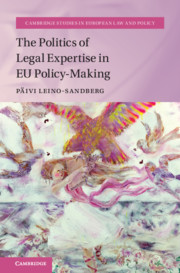Book contents
- The Politics of Legal Expertise in EU Policy-Making
- Cambridge Studies in European Law and Policy
- The Politics of Legal Expertise in EU Policy-Making
- Copyright page
- Dedication
- Contents
- Foreword
- Acknowledgements
- Table of Cases
- Table of Treaties, Legislation and Institutional Sources
- 1 Introduction
- 2 Who Are EU Legal Advisers?
- 3 What Do EU Legal Advisers Do?
- 4 Confidentiality of Legal Advice
- 5 The Commission Legal Service
- 6 Legal Advice in Council Decision-Making
- 7 Legal Advice in the European Parliament
- 8 Epilogue
- Bibliography
- Index
6 - Legal Advice in Council Decision-Making
Published online by Cambridge University Press: 16 September 2021
- The Politics of Legal Expertise in EU Policy-Making
- Cambridge Studies in European Law and Policy
- The Politics of Legal Expertise in EU Policy-Making
- Copyright page
- Dedication
- Contents
- Foreword
- Acknowledgements
- Table of Cases
- Table of Treaties, Legislation and Institutional Sources
- 1 Introduction
- 2 Who Are EU Legal Advisers?
- 3 What Do EU Legal Advisers Do?
- 4 Confidentiality of Legal Advice
- 5 The Commission Legal Service
- 6 Legal Advice in Council Decision-Making
- 7 Legal Advice in the European Parliament
- 8 Epilogue
- Bibliography
- Index
Summary
Chapter 6 discusses the prominence of law and the role of the Council Legal Service in Council discussions. The Council Legal Service is involved in the Council decision-making process at all levels and in all formations. In contrast to the Commission, where the institutional agenda tends to be relatively clear and is set from the top, the institutional interest of the Council and the ownership of its agenda is often more difficult to define, leaving Council legal advisers with more autonomy than their Commission peers. The Council Legal Service addresses Member State concerns and assists the Presidency in finding legally workable solutions. Council legal advisers routinely navigate in politically loaded waters. In negotiations between Member States, they use legal arguments to break deadlocks, and the solutions they provide often constitute the basis for negotiations. Law is frequently used to steer or limit discussions, or remove elements from the political agenda as legally not possible. In this process, legal advisers’ main objective is to safeguard their own credibility.
- Type
- Chapter
- Information
- The Politics of Legal Expertise in EU Policy-Making , pp. 197 - 256Publisher: Cambridge University PressPrint publication year: 2021

